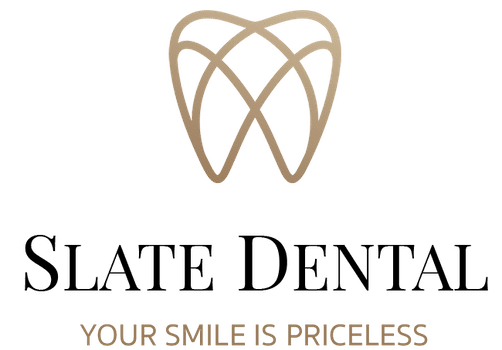A dental bridge is a fixed prosthetic that replaces one or more missing teeth. Dental bridges play an important role in maintaining oral health after tooth loss. They help restore your smile, improve chewing, and maintain the shape of your face. Dr. John Slate provides dental bridge treatment in Washington, DC.
Dental bridges are a restorative dentistry treatment that offers significant benefits, from enhancing your smile to improving oral function. If you are considering this option, schedule a consultation with Dr. Slate. Contact us today for more information.

Types of Dental Bridges in Washington, DC
When you’re missing one or more teeth, dental bridges can help restore your smile and chewing ability. Several types of bridges are available, each designed for different situations. During your consultation, Dr. Slate will examine your teeth and recommend the best option for your specific needs.
The best bridge for you depends on the number of teeth you’re missing, location of the gap in your mouth, and condition of your remaining teeth. The main types of dental bridges include:
Traditional Bridges
These are the most common type of bridge. They consist of artificial teeth (called pontics) held in place by dental crowns attached to the natural teeth on either side of the gap. These crowns are cemented onto your existing teeth, which serve as anchors for the bridge. Traditional bridges work well when you have strong, healthy teeth on both sides of the missing tooth.
Cantilever Bridges
Cantilever bridges are similar to traditional bridges but are used when there’s only one natural tooth next to the gap. The artificial tooth attaches to a single crown on one side rather than both. While this option can work in certain situations, it isn’t usually recommended for back teeth because they endure more chewing pressure.
Maryland-Bonded Bridges
Maryland-bonded bridges offer a more conservative approach. Instead of using crowns, these bridges attach to the backs of adjacent teeth with metal or porcelain wings. This means less alteration to your natural teeth. However, they may not be as strong as traditional bridges and work best for replacing front teeth where chewing forces are lighter.
Implant-Supported Bridges
For patients missing multiple teeth in a row, implant-supported bridges provide the most stable and long-lasting solution. Instead of relying on natural teeth for support, these bridges attach to dental implants surgically placed in your jawbone. This option helps preserve your jawbone health and doesn’t require altering healthy adjacent teeth. Implant bridges typically offer the most natural feel and function.
The Dental Bridge Procedure in Washington, DC
Several factors determine if dental bridges are right for you. Good oral health is crucial. A thorough evaluation by Dr. Slate will help in assessing your suitability. Sometimes, Dr. Slate may recommend other options like dental implants. After he decides you are a candidate for dental bridges, you will begin the process.
- Initial Consultation and Examination: The process begins with a comprehensive consultation. Dr. John Slate will examine your oral health and discuss your needs. You will undergo diagnostic impressions in preparation for preparing the abutment teeth and the customized final impression trays.
- Preparing the Abutment Teeth: The next step involves preparing the abutment teeth. We need to remove a small portion of the enamel to make room for the crowns. To create a temporary bridge, we will take impressions of your teeth after your teeth are prepared.
- Taking Impressions: Impressions of your teeth are then taken. We use these impressions to create a precise and custom bridge.
- Fitting and Placement of the Bridge: Once the bridge is ready, it is checked for fit and comfort. After any necessary adjustments, we cement the bridge in place.
Implant Bridge Treatment
An implant bridge offers a reliable way to replace multiple missing teeth without depending on your natural teeth for support. This advanced dental solution combines the strength of implants with the natural appearance of a bridge, giving you back your smile and chewing ability.
The process begins with placing small titanium implants in your jawbone where teeth are missing. These implants act like artificial roots that fuse with your bone over several months. Once healed, a custom-made bridge of replacement teeth attaches securely to the implants. The entire bridge is designed to match your natural teeth in color, shape, and function.
How Much is a Dental Bridge?
When considering dental bridges, you should also think about costs and maintenance. This can help you decide whether this option is right for you. The cost of a dental bridge in Washington, DC, varies based on factors like the type of bridge and materials used. Insurance may cover part of the cost. Slate Dental offers various payment options and financing plans to help manage expenses.
How to Care for a Dental Bridge
Taking care of your dental bridge is important if you want it to last a long time and keep your smile healthy. A dental bridge replaces one or more missing teeth, and just like your natural teeth, it needs regular care.
- Brush and Floss Every Day: Make sure to brush your teeth at least twice a day and floss once a day. Use a toothbrush with soft bristles and toothpaste with fluoride. When you floss, pay special attention to the area under the bridge. You may need special flossing tools, like a floss threader or an interdental brush, to clean between your teeth and under the bridge.
- Visit Dr. John Slate Regularly: Regular dental check-ups are important. Dr. Slate will check your bridge to make sure it’s still fitting well and working properly. These visits also help catch any problems early, before they become serious.
- Avoid Hard or Sticky Foods: Try not to bite down on very hard foods like ice or hard candies, as this can damage your bridge. Sticky foods can also pull at the bridge and loosen it over time.
Schedule an Appointment Today
Get a custom dental bridge in Washington, DC, from Dr. John Slate. Call Slate Dental today at (425) 584-3751. You can also request an appointment online. Let us know if you have questions and we’ll be happy to help.
